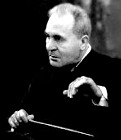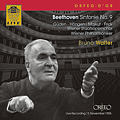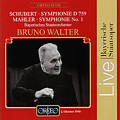ORFEO International
News
February 2012
50th † Bruno Walter
Bruno Walter, 
Bruno Walter
Foto: Archive of the Salzburg Festivalwho died fifty years ago on 17 February 1962, belonged to a generation of conductors who regarded it as self-evident that they would not only conduct music but also compose it and perform in public as pianists. 
C 669 051 B

C 818 101 B

C 430 961 B

C 562 021 BWalter worked for a time as Mahler’s assistant and spent his whole life championing his mentor’s works both in Europe and in America, where he was forced to flee in order to escape from National Socialist Germany. Following the war, however, he returned to many of the scenes of his former triumphs, notably Vienna and Salzburg – he had worked closely with the Vienna Philharmonic from an early date and frequently appeared at the Salzburg Festival during its early years. A number of these memorable performances are documented on the Orfeo label, including Mahler’s First Symphony and Schubert’s “Unfinished” with the Bavarian State Orchestra – among the works he premièred in Munich in his capacity as general music director of the Bavarian State Opera was Pfitzner’s Palestrina. A live performance from the Salzburg Festival captures Walter’s interpretation of another Mahler symphony, the Fourth, in a programme that also included Beethoven’s Egmont Overture – Beethoven was another of the composers who were central to Walter’s repertory. A second Salzburg concert features a live recording of Mozart’s Requiem set down late in Walter’s career. In 1955, finally, he officially reopened the rebuilt Vienna State Opera with a performance of Beethoven’s Ninth Symphony. It is a performance that ranks as one of the very special moments in the life of a conductor who, for all that he was marked by the 20th century, also had a lasting influence on the history of 20th-century music as a whole.
top |